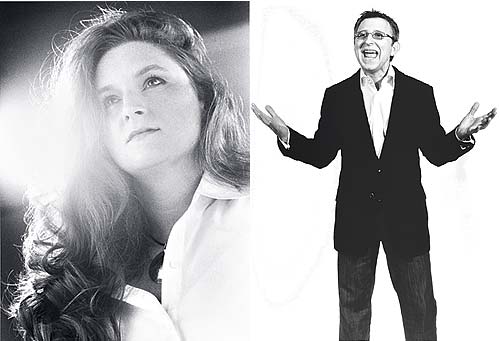
Gerald Schoenfeld
Chairman, the Shubert Organization
Broadway’s chief landlord. Of the district’s 39 theaters, the eightysomething head of the Shubert Organization controls seventeen—more than the other two major owners (Jujamcyn and the Nederlander Organization) combined. But Schoenfeld is more than a real-estate baron: He has the money to back any show he likes, whether it’s a blockbuster like Spamalot or a transfer like The History Boys.
Tom Schumacher
President, Disney Theatricals
Imagine Broadway without Disney. For that matter, imagine Times Square without Disney. Schumacher gave birth to The Lion King, Beauty and the Beast, Aida, plus the upcoming Tarzan and Mary Poppins. Even non-Disney productions (like Wicked) succeed on his brightly colored tourist-magnet model now. Gets his pick of the very few large Broadway houses. Rumored to be a candidate for next head of the Shubert board.
Nancy Coyne
Co-founder, Serino Coyne Advertising Agency
The marketer behind the mask—the Phantom’s half-mask, that is, a brand that became the prototype for putting tourist backsides in seats. (The wordless slogan travels well, too.) Since then, the founder of Broadway’s biggest ad agency has figured out ways to turn musicals into cash machines, hooking up Movin’ Out with Visa, Spamalot with Spam. She also spearheaded the civic-minded post-9/11 campaign that brought tourists back and came up with a discount program to get shows through the January doldrums.
Bernard Telsey
Broadway casting agent
Turns waiters into stars. Cast seven shows this year, out of just 22 that are still open. Nursed Norbert Leo Butz along from Rent replacement to Dirty Rotten Scoundrels star, where he stole the show, the Tony, and—judging by his new CBS sitcom deal—Les Moonves’s heart. Put Sara Ramirez in The Capeman way back in 1998, long before she busted out in Spamalot; got Harvey Fierstein into his Divine dress for Hairspray. Has a knack for the perfect off-kilter choice (Georgia Engel in The Drowsy Chaperone, Dick Cavett as the Narrator in The Rocky Horror Show). Currently scaring actors by saying he’s looking for nonactors, like musician-comic Stephen Lynch, the bright-eyed lead in The Wedding Singer.
Ben Brantley
Drama critic, the New York Times
The job has less power than it used to, but it can’t be ignored, especially when straight plays and Off Broadway are concerned. A rave for History Boys in London? It made a lively transfer to New York, capped by another Brantley rave here. A tepid review of Bounce in Washington? It never made it to New York. A warm singling-out of Jan Maxwell, co-star of the underpowered Chitty Chitty Bang Bang and the wretched Entertaining Mr. Sloane? She’ll live to work again.
Stephen Sondheim
Composer and lyricist
Has kept a particular kind of musical—the fifties beau ideal of high-wire lyrics and scores rather than harnesses and light shows—alive. The 76-year-old came roaring back onto Broadway last fall with John Doyle’s minimalist Sweeney Todd and remains the godfather to all serious theater composers (notably Adam Guettel and Michael John LaChiusa).
Joe Mantello
Director
Has three shows on Broadway right now, and it hardly matters that two (Three Days of Rain and The Odd Couple) were universally panned. Makes stars like Julia Roberts comfortable; is Broadway’s most versatile and in-demand director, equally fluent with difficult stuff critics love (Assassins) and big crowd-pleasers (Wicked). Can do plays (Take Me Out) and musicals alike. If you get Mantello, you’ve got a show: “The top producers, the top talent, the top money,” says an insider. “The river will move for him.”
Elena K. Holy
Producing artistic director, the New York City International Fringe Festival
Turned the Fringe Festival, which she founded in 1996, into Sundance for the theater crowd—a place where anyone with an idea and a tiny budget can get noticed. Urinetown, the 1999 Fringe musical that made it to Broadway and won three Tonys, is the most extreme example, but more than a dozen Fringe shows have gone on to significant Off Broadway runs. Applications approached 1,000 last year. Her triumph: retaining the fest’s brilliant lunacy amid commercial success. Next: The Influentials in TV & Radio